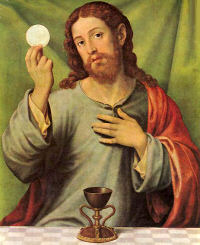Ordinary Time: June 19th
Solemnity of the Most Holy Body and Blood of Christ
Other Titles: Corpus Christi
"While they were eating, he took bread, said the blessing, broke it, gave it to them, and said, 'Take it; this is my body.' Then he took a cup, gave thanks, and gave it to them, and they all drank from it. He said to them, 'This is my blood of the covenant, which will be shed for many.'"
Where the Solemnity of the Body and Blood of Christ is not observed as a holy day, it is assigned to the Sunday after Trinity Sunday, which is then considered its proper day in the calendar.
Please see this special section on Corpus Christi.
Corpus Christi Sunday
Corpus Christi (Body and Blood of Christ) is a Eucharistic solemnity, or better, the solemn commemoration of the institution of that sacrament. It is, moreover, the Church's official act of homage and gratitude to Christ, who by instituting the Holy Eucharist gave to the Church her greatest treasure. Holy Thursday, assuredly, marks the anniversary of the institution, but the commemoration of the Lord's passion that very night suppresses the rejoicing proper to the occasion. Today's observance, therefore, accents the joyous aspect of Holy Thursday.
The Mass and the Office for the feast was edited or composed by St. Thomas Aquinas upon the request of Pope Urban IV in the year 1264. It is unquestionably a classic piece of liturgical work, wholly in accord with the best liturgical traditions. . . It is a perfect work of art.
—Excerpted from The Church's Year of Grace, Pius Parsch.
In the words of St. Thomas:
"How inestimable a dignity, beloved brethren, divine bounty has bestowed upon us Christians from the treasury of its infinite goodness! For there neither is nor ever has been a people to whom the gods were so nigh as our Lord and God is nigh unto us.
"Desirous that we be made partakers of His divinity, the only-begotten Son of God has taken to Himself our nature so that having become man, He would be enabled to make men gods. Whatever He assumed of our nature He wrought unto our salvation. For on the altar of the Cross He immolated to the Father His own Body as victim for our reconciliation and shed His blood both for our ransom and for our regeneration. Moreover, in order that a remembrance of so great benefits may always be with us, He has left us His Body as food and His Blood as drink under appearances of bread and wine.
"O banquet most precious! O banquet most admirable! O banquet overflowing with every spiritual delicacy! Can anything be more excellent than this repast, in which not the flesh of goats and heifers, as of old, but Christ the true God is given us for nourishment? What more wondrous than this holy sacrament! In it bread and wine are changed substantially, and under the appearance of a little bread and wine is had Christ Jesus, God and perfect Man. In this sacrament sins are purged away, virtues are increased, the soul is satiated with an abundance of every spiritual gift. No other sacrament is so beneficial. Since it was instituted unto the salvation of all, it is offered by Holy Church for the living and for the dead, that all may share in its treasures.
"My dearly beloved, is it not beyond human power to express the ineffable delicacy of this sacrament in which spiritual sweetness is tasted in its very source, in which is brought to mind the remembrance of that all-excelling charity which Christ showed in His sacred passion? Surely it was to impress more profoundly upon the hearts of the faithful the immensity of this charity that our loving Savior instituted this sacrament at the last supper when, having celebrated the Pasch with His disciples. He was about to leave the world and return to the Father. It was to serve as an unending remembrance of His passion, as the fulfillment of ancient types — this the greatest of His miracles. To those who sorrow over His departure He has given a unique solace."
- The fourteenth encyclical letter of Pope St. John Paul II Ecclesia de Eucharistia (On the Eucharist in Its Relationship to the Church) released on Holy Thursday, April 17, 2003. The focus of the papal encyclical is the celebration of the Eucharist; the Pope reminds us that the Eucharist is the center of Catholic spiritual life.
- Redemptionis Sacramentum (On certain matters to be observed or to be avoided regarding the Most Holy Eucharist), an Instruction released by the Congregation for Divine Worship and the Discipline of the Sacraments on March 25, 2004.

No comments:
Post a Comment